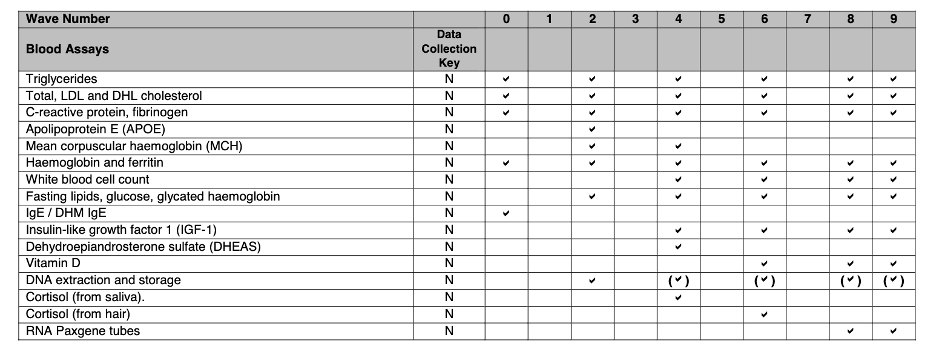Overview
The English Longitudinal Study of Aging (ELSA) is funded by a combination of UK government departments and the National Institutes on Aging. Its focus is to produce data on aging to fulfill key requirements for the scientific and policy communities in the US and Britain. Its data collection effort has been closely modeled on the US Health and Retirement Survey, with the crucial additions of biological markers of disease and detailed assessments of social and psychological factors. Specific objectives set out in the ELSA were to design and implement data collection on a population aged 50 or older at inception, and to document and distribute the data that are produced. Specific issues that the data collection set out to allow to be addressed were:
- Health, disability, healthy life expectancy.
2. The relationship between economic position and both physical and cognitive health.
3. The determinants of economic position and economic activity at older ages.
4. Social networks, support, and participation.
5. Household and family structure and the transfer of resources.
Data Collection
As its name implies, ELSA is a panel study of those aged 50 or older at inception and representative of the private household dwelling population of England. It is a household-based study, so for completeness of information spouses aged under 50 are also included in the data collection, giving a total sample of around 12,000 people. The sample was recruited from the Health Survey for England (similar in nature to NHANES, including biological, physiological and anthropometric assessments). The Health Survey for England uses a clustered stratified probability sampling technique, which means that the sample is representative of different types of areas (determined in terms of degree of urbanization and deprivation), and that geographical data can be attached to the sample. At wave 3 respondents were invited to participate in a life-history interview (to capture information about important events that had taken place previously in their lives). A risk and time preference module were carried out in Wave 5. Physiological measures, biomarkers, and functional capacity were assessed in Wave 6 and Wave 8. Wave 9 data include an online dietary questionnaire, which began in July 2018.
A wide variety of data are collected in ELSA, including demographic data (Income, employment, consumption, expectations), Health (Health behaviors, mental health, psychological and social well-being) and other measures of functioning (Social and civic participation, cognition).
Biomarkers
From its inception, there has been a focus on the collection of biomarkers in ELSA as the collection of blood samples by a nurse in the participant’s home was a feature of the data collection protocol. To date there have been five such nurse visits, including a baseline ‘wave 0.’ Nurse visit from waves 2, 4, 6, 8 was based on the whole sample while that of waves 8 and 9 was based on the half sample.
